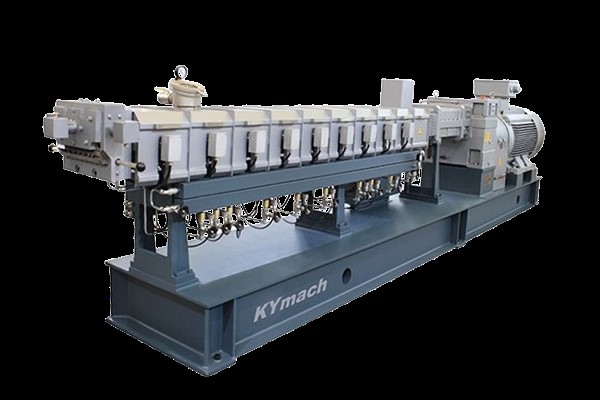In multiple industries such as plastic processing, chemical engineering, and food production, the extruder, as a key piece of production equipment, directly impacts product quality and production costs through its performance and efficiency. In recent years, with continuous technological advancements, the parallel co-rotating twin-screw extruder has gradually become a popular choice in the market due to its unique design advantages and efficient extrusion performance.

Parallel co-rotating twin-screw extruders, as the name suggests, are characterized by two screws that are parallel and rotate in the same direction. This design allows for more uniform and efficient shearing, mixing, and conveying of materials between the screws. Compared to single-screw extruders, twin-screw extruders have stronger mixing capabilities and higher extrusion efficiency, making them especially suitable for processing high-viscosity, high-fill materials.
In the field of plastic processing, parallel co-rotating twin-screw extruders are widely used in plastic modification, granulation, blending, and the preparation of reinforced materials. Their efficient mixing capabilities and precise temperature control systems ensure uniform mixing and stable extrusion of plastic raw materials, resulting in high-quality, performance-stable plastic products.
Additionally, in the chemical engineering industry, this extruder also plays an important role. It can be used to produce granules, sheets, and films of various chemical raw materials. By adjusting the structure and speed of the screws, different levels of shearing and mixing of materials can be achieved, meeting the production needs of different products.
It is worth mentioning that the applications of parallel co-rotating twin-screw extruders in the food and pharmaceutical industries are also increasingly widespread. In the food industry, it can be used to produce granules, powders, and semi-finished products of various food raw materials; in the pharmaceutical industry, it can be used for the preparation of drug granules, capsule shells, and pharmaceutical excipients. These applications not only improve production efficiency and product quality but also reduce production costs and energy consumption.
However, the use of parallel co-rotating twin-screw extruders also requires attention to some issues, such as screw wear, material adaptability, and equipment maintenance. Therefore, when using this equipment, it is necessary to strictly follow the operating procedures and regularly maintain and upkeep the equipment to ensure its long-term stable operation.
In summary, the parallel co-rotating twin-screw extruder, with its efficient and stable extrusion performance and wide range of applications, plays an irreplaceable role in multiple industries. With continuous technological advancements and market expansion, this equipment is expected to be more widely used and developed in the future.
 Tel: +86-25-52706155
Tel: +86-25-52706155
 E-mail: info@kymach.com
E-mail: info@kymach.com
 No.59 West Tianyuan Road, Jiangning, Nanjing, Jiangsu Province, China
No.59 West Tianyuan Road, Jiangning, Nanjing, Jiangsu Province, China